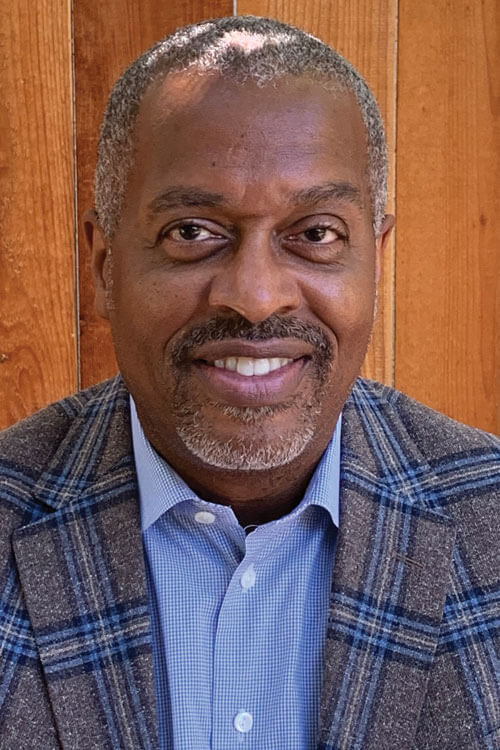 One day, Preston DuFauchard ’74 was living in public housing on the South Side of Chicago, afraid to walk two blocks to get a haircut because the neighborhood was so tough.
One day, Preston DuFauchard ’74 was living in public housing on the South Side of Chicago, afraid to walk two blocks to get a haircut because the neighborhood was so tough.
Virtually overnight, he found himself living in the dormitory of a boys boarding school in Colorado, seeing the Rocky Mountains for the first time, and discovering that the nearest grocery store was more than a mile walk through fields of cows and horses.
“It was certainly eye-opening, because I had never been outside Chicago’s South Side,” he says. “And a lot of the people I interacted with never knew anything but the South Side.”
It was 50 years ago this fall that DuFauchard made that life-changing journey to Colorado Academy, thanks to “A Better Chance.” Since 1963, this national nonprofit organization has served talented students of color by placing them in the country’s premier college preparatory schools. Graduates of “A Better Chance” boast notable success—83 percent earn a bachelor’s degree and 50 percent earn a master’s or other professional degree. DuFauchard earned his BA at Stanford University and his JD at the University of California Berkeley.
“For me, Colorado Academy was a lucky break and a great, great academic experience,” he says. “It gave me all the academic tools I needed and the knowledge of how to learn.”
‘I could adjust to anything’
Most young people who wanted to escape from the neighborhood where DuFauchard grew up chose the military. But sharp-eyed and caring Chicago public school teachers intervened on his behalf, introducing him to the scholarship program that would change his life. His parents were not convinced.
“They were skeptical about the whole thing, because it was free,” he says. “The way they saw it, no opportunity that good could be free.”
DuFauchard arrived as a Ninth Grade student at CA when it was still an all–boys boarding school. To him, the campus was “beautiful.” When the school began admitting girls and the dorms closed, he had another lucky break—he could move in with an aunt and uncle who lived in Littleton.
A natural artist, he worked on the school newspaper with classmate Susan Boxer ’74. Stanford made it onto his radar when another fellow student, Jeff Kleiner ’74 , attended a summer program there and raved about it. He was accepted by both Princeton and Stanford, and he chose Stanford because of the better financial aid package.
“Coming from CA really helped me get through the beginning years of college,” he says. “Knowing that I could come from the inner city of Chicago to CA and make that adjustment gave me the confidence that I could adjust to anything.”
‘I am learning on the job’
DuFauchard has been a leader in the San Francisco Bay Area legal community for his entire career and has served on numerous boards, but, true to the CA mission, he is a lifelong learner and has recently taken a new position where, he says, “I am learning on the job.”
He started his career handling litigation, trials, and appeals, including mass tort cases, environmental insurance coverage litigation, securities litigation, and civil rights cases. He went on to join the in-house legal department for Bank of America Corporation, where he was Assistant General Counsel.
In 2006, he was named Commissioner for the California Department of Corporations, which is essentially the SEC for the state of California. He worked to regulate non-bank lenders in the business of making home loans during the Great Recession foreclosure crisis. The experience gave him new insight. “When you are a lawyer, you represent one party, but when you work for the state you can create policy that helps a broader group of people,” he says. “In that job, I began to understand the importance of helping people who were less well off.”
Today, he is the CEO of the West Oakland Health Center, a “radical departure” from his previous positions. He joined the board in 2015, because he wanted to give back to the community where he lives by helping the organization handle some challenges and find a new CEO. As circumstances evolved, the best choice for the CEO position was—Preston DuFauchard. In this new position, he runs a group of safety–net community health clinics serving the health, behavioral, dental, optometry, and pharmacy needs of 10,000 unique patients—adults and children—in the midst of a pandemic and racial protests.
“It’s very demanding, and the pace is breathtaking,” he says. “In a company, you answer to the CEO. At the state, I answered to the governor. Here we have so many constituents—patients, the city, the county, state officials, the board—multiple stakeholders. But my strength is problem solving, so we are seeing some good results.”
‘It’s knowledge’
DuFauchard remembers his days at CA with great fondness. He enjoys returning for reunions. He remains close with several classmates, including Rob Tallmadge ’74. Several years ago, he had lunch with his CA English teacher, Renee Ruderman, and was surprised when she presented him with a box of his drawings, dating back to the early 70s, which she had saved for decades.
But the greatest gift that CA gave him, he says, is one that no one can take away. “It’s knowledge,” he says simply. “CA taught me to have intellectual curiosity.”